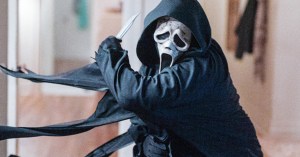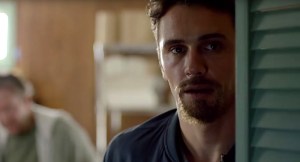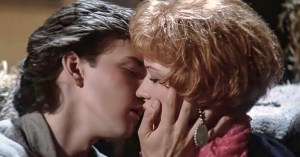Five Favorite Films with Rose McGowan
The Conan the Barbarian star also talks about the new film and growing up watching old movies in Italy.
Over the course of her 19-year career, Rose McGowan has established quite an eclectic resume, working with notable directors across several genres and moving effortlessly between film and television. She landed her first movie role in the Pauly Shore comedy Encino Man and later garnered praise for her portrayal of a troubled teen fugitive in The Doom Generation. For the next decade, McGowan split her time mostly between smaller, independent movies and a career-defining role on the fantasy drama Charmed until her involvement in the Quentin Tarantino/Robert Rodriguez project Grindhouse brought her front and center again.
This week, she continues her string of strong but flawed female characters as the evil sorceress Marique in Marcus Nispel’s Conan the Barbarian, and we were happy to chat with her about the film. When asked about her Five Favorite Films, McGowan said, “I’ll probably do five of my favorite films, because they’re always different. I always have to go by genre, too, my tops in each genre. There are many more. Doris Day films, Preston Sturges films; I’m a total geek.” She not only gave us her Five Favorite Films, but also talked about what it was like growing up and watching movies overseas, and how she influenced a rather taboo relationship in Conan. Read on for the full interview!
Night of the Hunter (1955, 98% Tomatometer)
I’d say Night of the Hunter. It’s an amazing film. That’s where the original “love” and “hate” tattoos on the hand came from. A lot of people don’t know that. You know, the good Christianity, the true Christianity, versus the false prophet thing that plays out in there, and the imagery. It’s an intense and beautiful film. And I love Robert Mitchum. I wish he’d come back to life.
Out of the Past (1947, 96% Tomatometer)
I also love — another Robert Mitchum movie — Out of the Past, which I think is kind of neck and neck with another fantastic film noir, Double Indemnity. Double Indemnity is amazing; Out of the Past is another one, but I think it ranks up there.
So you’re a big Robert Mitchum fan in general.
I love Robert Mitchum, apparently. [laughs] But I just happen to like these two movies. I like old films. I co-host a show on TCM {Turner Classic Movies) called The Essentials.
The Godfather/The Godfather Part II (1972, 100% Tomatometer/1974, 98% Tomatometer)
I love the Godfathers, one and two, but I feel like that should count as one film.
Scarface/Scarface (1932, 100% Tomatometer/1983, 88% Tomatometer)
For a kind of over-the-top-ness, I love the original Scarface, and then I like the [Al] Pacino Scarface. Both of them are fantastic.
Some Like It Hot (1959, 98% Tomatometer)
I think probably Some Like It Hot might be the most perfect comedy ever done.
Next, McGowan talks about growing up watching movies in Italian and how she made her Conan character slightly taboo.
RT: Did you grow up watching a lot of older films?
Rose McGowan: I did. We were the weirdos on the block. You know, my dad would say, “Hey, they’re rereleasing a remastered version of Lawrence of Arabia on 70mm,” and we’d all be like, “Yay!” [laughs] Yes, we would be excited about that.
Now, I understand you didn’t speak English until you moved to the States.
Well, I understood English; I just refused to speak it. My parents would say things in English to me and I would answer in Italian. I just refused.
So when you were watching these older films, was that before you moved here or after?
Hmm… Kind of both. It’s interesting though, because, you know, everything is dubbed over in Italy, so the first time I saw Gone with the Wind, Mammy was speaking Italian and everybody had the same voice. All the women had the same voice, and all the men had the same voice. And I remember seeing it when I came here, and I was like, “Mammy? That does not sound like the Mammy that I know.”
It’s stuff you don’t think about. Like, people over there, I would say pre-cable or DVDs, older people there, if they didn’t speak any English, they’ve probably only ever heard a lot of these classic films with one voice. It’s especially funny seeing African-American actors speaking Italian, and you’re like, “But you’re in the South, Mammy.”
Are you still fluent in Italian?
I’m an unfortunate mix of French, Italian, and Spanish now, pretty much in one sentence. So I’m kind of useless everywhere. I lived in Montreal after Italy, so then the French Canadian got into my head. And then, living in LA, that’s all Espanol. I’m pretty useless. I go to Italy and someone speaks Italian to me, and it translates in my head to French, and I answer in French. I kind of answer in the wrong languages everywhere; it’s annoying, and makes me look like crazy town. [laughs] They’re staring at me like, “What?”
Well, let’s talk about Conan. As I understand it, the role that you play, Marique, was originally a character named Fariq, who was male. Can you talk a little bit about how that change came to be, and what part, if any, you played in making that change happen?
Well, I didn’t play a part in that decision making process, although I wholeheartedly agree with it. What I was happy about was, once I was sent the script, and they said “Ignore the fact that it says ‘Fariq’ and it’s ‘him’ and ‘he,'” I was excited because I knew that because it had been written for a man, then that means it’s sure to be a strong character.
So when they sent you the script, someone had already made the decision that maybe a woman could play this role.
Oh yes. You know, it’s so funny because there’s about 30 different people that I’ve heard who’ve taken credit for that, from the costume designer to… You know, “Why is the costume designer making that choice? She’s amazing, but who knows? Maybe she’s right.” I have no clue. It was everybody’s stroke of inspiration.
Well, the gender change is interesting because there’s definitely a peculiar dynamic that can develop in a father-daughter relationship that’s less likely in a father-son relationship.
Uh, yes!
And based on that, I have to ask, though it’s never explicitly stated in the film…
It’s not your imagination.
There are a couple of moments when the story hints at something kind of taboo going on in that relationship between Marique and her father, Khalar Zym.
Correct.
Was that something written into the script?
No. I just thought it would be funny. I thought, you know, there’s nothing wrong with having a big summer movie that has some little subversive elements, little twists and turns here and there. The writer and I talked about it, and the studio was pretty freaked out by it, so I added what I could.
In the end, though, I think it’s safely ambiguous, because the audience is left wondering, “Does she really feel this way, or is she just hungry for the power of the mask?”
No, I don’t think she really cares at all about the mask. I think she’d be totally fine with the mask being destroyed. I think she’s sick and tired of hearing about her dead mother, and she would prefer to take her mother’s place… in every way. I mean, it’s obviously an Electra complex, so I think it lends sort of a Greek tragedy aspect to it. Quite tragic because her love will be unfulfilled; that sort of thing.
Jason Momoa, who stars as Conan, is a big fan of the character and the franchise. How familiar were you with the character and its legacy?
I was fairly familiar with it, because of my brother. He had a lot of Robert E. Howard’s work, and he liked the comic books and things like that. I’ve never seen the full Arnold Schwarzenegger films. I mean, I remember seeing snippets on Saturday afternoon TV here and there, so I kind of have some images from it, but I think those were more campy. Jason, to me, looks like he walked straight out of Robert E. Howard’s conception of this character. It’s amazing.
What is it about these darker roles that you seem to be drawn to?
Well, see, not really, if you think about it. I think I just play strong women. Like, I saved the world on Charmed for five years, and I saved the world in Planet Terror. I did one movie where I was pretty sarcastic — that’d be Jawbreaker — but other than that, really just strong female characters. Not necessarily bad, but people unfortunately tend to mix that up.
Conan the Barbarian (2011) opens this weekend in the US.





